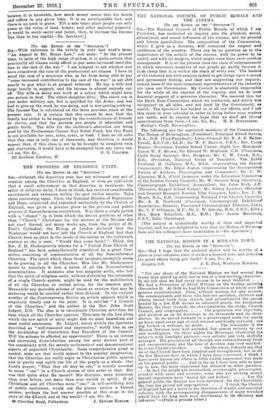(To THE Enrroa or THE " SPECTATOR.") Bia,—With reference to
the article in your last week's issue, " An Appeal to Mr. Bonar Law," you state : " At the present time, in spite of the high range of prices, it is quite certain that practically all classes could afford to pay some increased contribu- tion to the cost of the war." I am tempted to ask whether you have considered the case of the professional art classes. I have in mind the case of a musician who, so far from being able to pay "some increased contribution to the cost of the war," is not able nearly to pay what is at present enforced. He has a wife and large family to support, and his income is almost entirely cut off. The wife is doing war work at a salary which might keep one person in food. The eldest daughter ditto. The eldest son is just under military age, but is qualified for the Army, and has had to give up the work he was doing, and is now getting nothing. The Income Tax is calculated on the three previous years at the present rate. It is certain that this cannot be met, that the family has either to be supported by the contributions of friends or starve, and that the parents are people of education and gentle birth. The bills for the children's education are being paid by the Professional Classes War Relief Fund, but this Fund is not available for rent, rates, taxes, or food. I hear on all sides that this case is only one of thousands, and therefore it would appear that, if this class is not to be brought to complete ruin and starvation, it would have to be exempted from any extra tax.


































 Previous page
Previous page